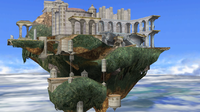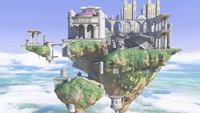Temple (stage): Difference between revisions
m (Text replacement - "Category:Temples and shrines" to "Category:Temples") |
m (→My Music) |
||
| Line 19: | Line 19: | ||
|- | |- | ||
|align=center|Temple (Melee) | |align=center|Temple (Melee) | ||
|align=center|''Zelda II: The Adventure of Link'' | |align=center|''[[zeldawiki:Zelda II: The Adventure of Link|Zelda II: The Adventure of Link]]'' | ||
|Original | |Original | ||
| | | | ||
| Line 62: | Line 62: | ||
|- | |- | ||
|align=center|Gerudo Valley | |align=center|Gerudo Valley | ||
|align=center|''The Legend of Zelda: Ocarina of Time'' | |align=center|''[[zeldawiki:The Legend of Zelda: Ocarina of Time|The Legend of Zelda: Ocarina of Time]]'' | ||
|Original | |Original | ||
|- | |- | ||
Revision as of 04:52, December 2, 2021
- This article is about the stage from the Super Smash Bros. series. For the location in Wario Land 3, see The Temple.

Temple is a stage in Super Smash Bros. Melee, being notable for being the largest selectable map in the game. This level is loosely based off the The Legend of Zelda series of games. Though not based on a specific area from any game, it most closely resembles the various temples and castles that Link visited in Zelda II: The Adventure of Link. The music playing during the level is taken from that particular game as well.
The stage reappears in Super Smash Bros. Brawl where it features a new unlockable arrangement of the music that plays on the stage, known as "Great Temple / Temple."
The stage also reappears in Super Smash Bros. for Wii U. In this game, both the standard and Final Destination variants of the stage are selectable in 8-Player Smash. The Final Destination form takes place on a flat platform in midair. Parts of the standard Temple stage can be seen in the background. The stage also returns in Super Smash Bros. Ultimate.
In Super Smash Bros. Melee, the unlock match for Roy takes place here, and an arrangement of the recruitment and title themes from Fire Emblem: Shadow Dragon and the Blade of Light serves as the stage's alternate background music, as there is no Fire Emblem stage in the game. In future appearances of the stage, this arrangement plays on Castle Siege instead. In Super Smash Bros. Ultimate, the unlock match for Zelda takes place here.
My Music
Super Smash Bros. Brawl
| Name | Source | Credits | Requirements |
|---|---|---|---|
| Temple (Melee) | Zelda II: The Adventure of Link | Original | |
| Great Temple / Temple | Zelda II: The Adventure of Link | Arrangement Supervisor: Shogo Sakai | Clear Event 33 on Hard. |
Super Smash Bros. for Wii U
| Name | Source | Credits | Requirements |
|---|---|---|---|
| Great Temple / Temple | Super Smash Bros. Brawl (Zelda II: The Adventure of Link) |
Arrangement Supervisor: Shogo Sakai | |
| Full Steam Ahead (Spirit Tracks) | The Legend of Zelda: Spirit Tracks | Arrangement Supervisor: Michiko Naruke | Clear Solo Classic at intensity 5.5 or higher as Wario without any customizations |
| Temple Theme | Super Smash Bros. Melee (Zelda II: The Adventure of Link) |
Arrangement Supervisor: Shogo Sakai | |
| Main Theme (The Legend of Zelda) | Super Smash Bros. Melee (The Legend of Zelda) |
Arrangement Supervisor: Takuto Kitsuta | |
| Song of Storms | Super Smash Bros. Brawl (The Legend of Zelda: Ocarina of Time) |
Arrangement Supervisor: Tsukasa Masuko | |
| The Dark World | Super Smash Bros. Brawl (The Legend of Zelda: A Link to the Past) |
Arrangement Supervisor: Arata Iiyoshi | |
| Gerudo Valley | The Legend of Zelda: Ocarina of Time | Original | |
| Dragon Roost Island | The Legend of Zelda: The Wind Waker | Original | Collect CD |
| Hyrule Main Theme | The Legend of Zelda: A Link Between Worlds | Original | Collect CD |
| Yuga Battle (Hyrule Castle) | The Legend of Zelda: A Link Between Worlds | Original |
Events
- No 18: Link's Adventure (Melee)
- No 20: All-Star Match 2 (Zelda's fight) (Melee)
- No 29: Triforce Gathering (Melee)
- No 40: All-Star Match 4 (Marth's fight) (Melee)
- No 41: En Garde! (Melee)
- No 46: Fire Emblem Pride (Melee)
- No 49: All-Star Match Deluxe (Roy's fight) (Melee)
- No 33: Advent of the Evil King (Brawl)
- Co-Op No 13: Blades of the Quick and Mighty (Brawl)
Names in other languages
| Language | Name | Meaning | Notes |
|---|---|---|---|
| Japanese | 神殿[?] Shinden |
Temple | |
| Chinese | 神殿[?] Shéndiàn |
Temple | |
| German | Hyrule-Tempel[?] | Hyrule Temple | |
| Italian | Il tempio[?] | The temple | |
| Korean | 신전[?] Sinjeon |
Temple | |
| Russian | Храм[?] Khram |
Temple | |
| Spanish (NOA) | Templo[?] | Temple |
Trivia
- This stage is the only returning stage in Super Smash Bros. Brawl to have a music track that is original to the game and not taken from Super Smash Bros. Melee.
- In the Wii U version, the platforms have Hylian text on them. This text comes from The Legend of Zelda: The Wind Waker. When translated to Japanese, it reads "Super Smash Bros."
